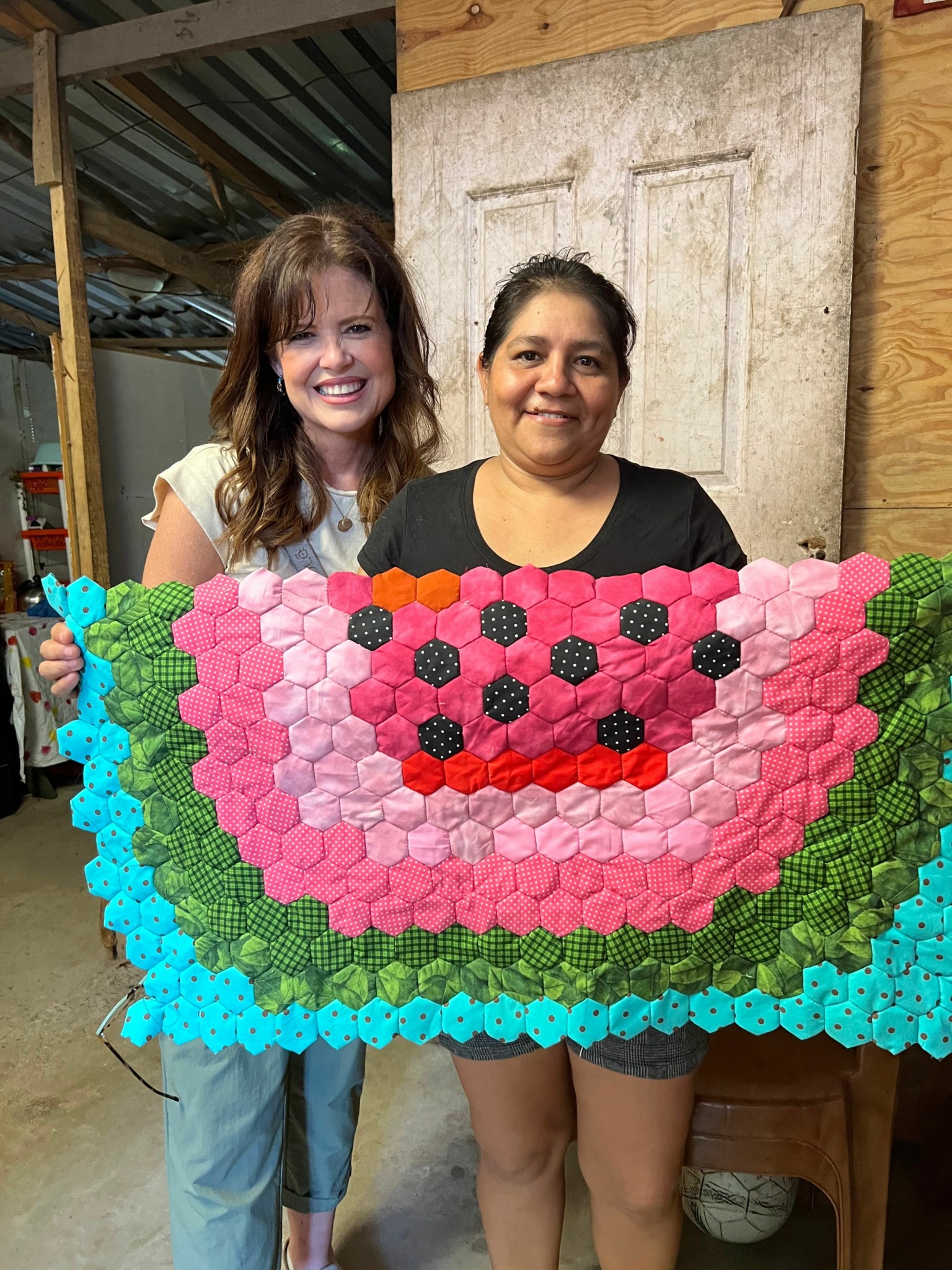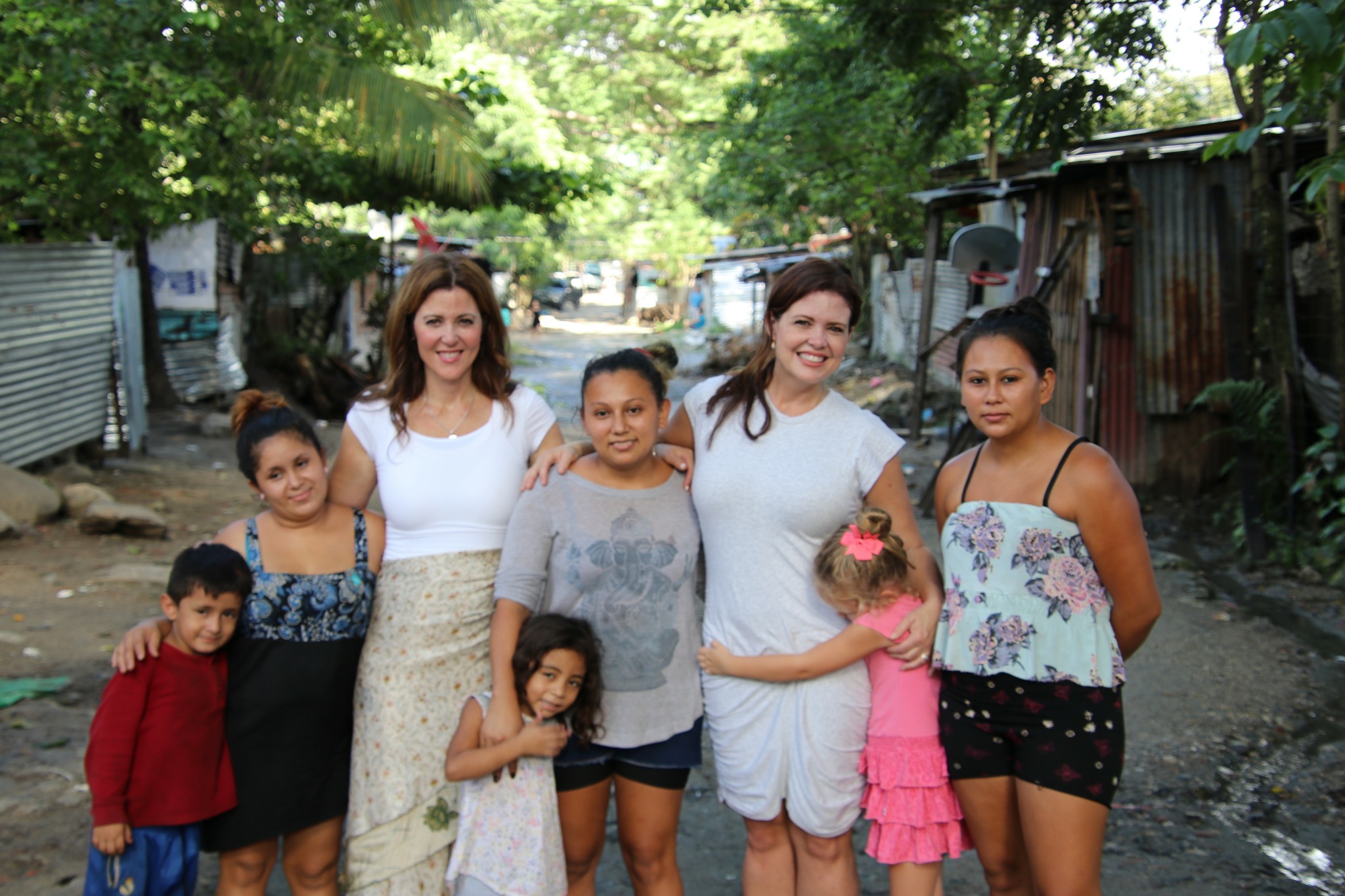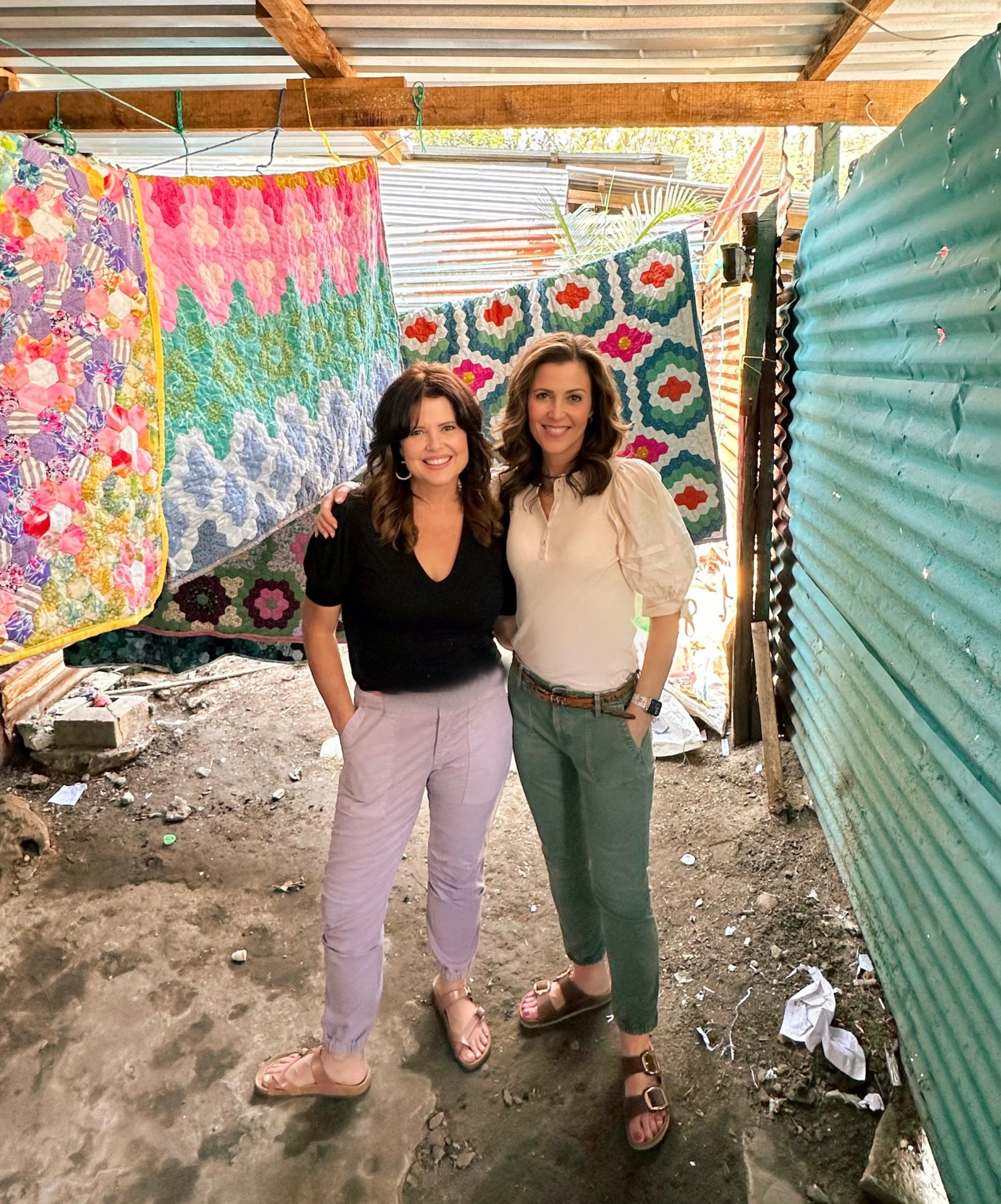Alright – so today we’ve got the honor of introducing you to Courtney Kimball. We think you’ll enjoy our conversation, we’ve shared it below.
Courtney, thanks for joining us, excited to have you contributing your stories and insights. Let’s start with the story of your mission. What should we know?
The Accidental Beginning of One Common Thread
One Common Thread began almost by accident. While living in San Pedro Sula, Honduras, a 13-year-old girl named Skarleth approached me, asking if there was a way she could earn $5 to cover her bus fare to the capital, Tegucigalpa. At the time, I was working on an English Paper Pieced (EPP) hexagon quilt for my oldest daughter. These quilts are entirely handmade and labor-intensive—each one requiring around 1,500 fabric pieces basted around small 1-inch hexagons before being sewn together.
The basting process is tedious, so I offered Skarleth the opportunity to help me by basting hexagons. She completed 500 hexagons in just a few hours, and I paid her 500 Lempiras (about $20 USD). The next day, Skarleth’s mother, aunts, and cousins all called me, asking if they could help as well.
I hadn’t realized that Skarleth’s father only earned about $30 a week working construction in San Pedro Sula. After a phone call to my sister in the States, we recognized that we could do more to help these women, who were desperate for work. What began with selling hexagon quilt kits quickly grew into producing finished quilts and other products.
The Meaning Behind One Common Thread
The name “One Common Thread” reflects the bond we share with the women we work with, despite the vast differences in our lives. My sister and I, and the women in the slums of Honduras, are all mothers, sisters, cousins, and women. Though our circumstances may be worlds apart, we are united by a common desire—to help our children have a better future. This shared purpose is our “one common thread,” connecting us with love and determination to make a meaningful difference.
Our Mission and How We Accomplish It
Guided by this theme, we created our mission statement:
“Our mission is to empower women by developing self-worth through the opportunity to work, receive a sustainable income, and set a new standard for their children. We do that, one hexagon at a time.”
We accomplish this mission by providing the women in the slums of Honduras with the chance to earn a steady income by handcrafting quilted art pieces. Each woman is paid fairly for her labor, gaining not only financial independence but also the dignity that comes from contributing to her family’s well-being. In turn, the women pass down this sense of pride and responsibility to their children, setting a new standard for future generations.
Through our programs, we also provide skills training, leadership opportunities, and a supportive community that encourages self-worth and personal growth. The women are not just making quilts—they are transforming their lives and building brighter futures, one hexagon at a time.
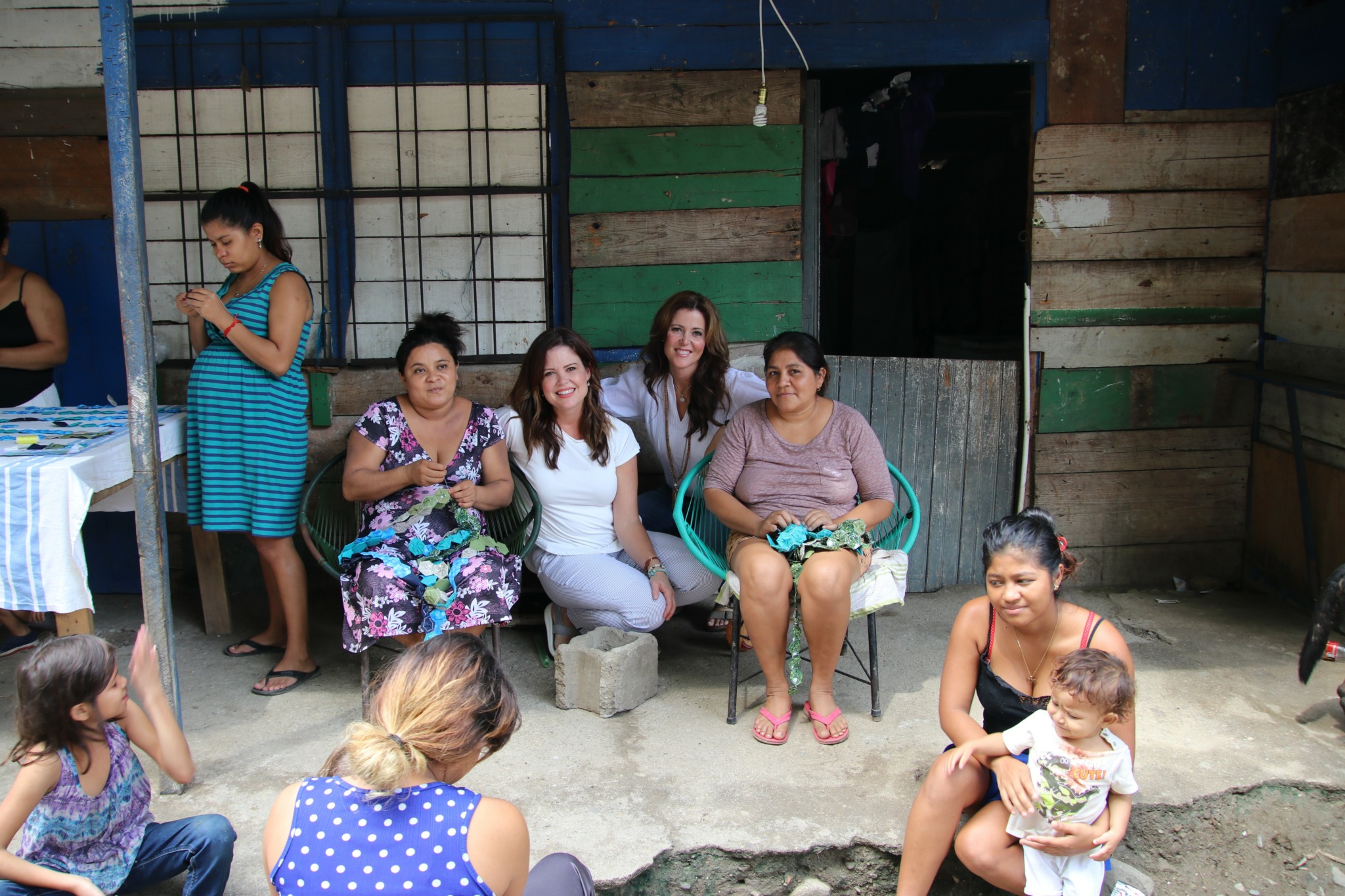
Courtney, love having you share your insights with us. Before we ask you more questions, maybe you can take a moment to introduce yourself to our readers who might have missed our earlier conversations?
On a personal level, I am most proud of being a mother. My husband and I have been married for almost 31 years, and together we’ve raised nine children, ranging in age from 28 to 9. (One of our daughters is deceased.) I attended Brigham Young University, but I have never pursued a paid professional career. Instead, I’ve dedicated my time and energy to raising well-behaved, accomplished children.
Throughout my life, I’ve always been creative, with a wide range of hobbies, and I’ve volunteered for many causes. I’ve been sewing for as long as I can remember, but I never considered myself an actual quilter. However, when we moved to Honduras, I left my sewing machine behind, still wanting to make a special quilt for my oldest daughter, who was getting married. It was around that time that I learned the technique of hand-sewing quilts using English Paper Pieces. This technique turned out to be a game changer, and I ended up teaching it to the women in the slums of Honduras.
This was incredibly fortuitous, as sewing with machines would not have been feasible in those conditions. By knowing how to hand-sew, I was able to teach the women Makers in the community. I also design all of the quilts and work with the women to incorporate their input, ensuring the final product is a high-quality work of art.
Since creating One Common Thread, I’ve learned so many new skills, much like being a mother—skills I never anticipated. I’ve learned how to build and nurture a social media presence, how to manage public relations with our customers and donors, and how to promote and produce our products. I’ve gained knowledge of running a non-profit foundation, from setting up a retail website to giving interviews and teaching classes. I’ve had the privilege of speaking to humanitarian and quilting groups, sharing our story and mission.
I’ve also learned how to ask for donations and how to rally volunteers to help, since we have no paid employees. All of my time, and that of our volunteers, is donated. The volunteer base fluctuates depending on the season and need, but regardless, this work has been a labor of love, much like motherhood itself.
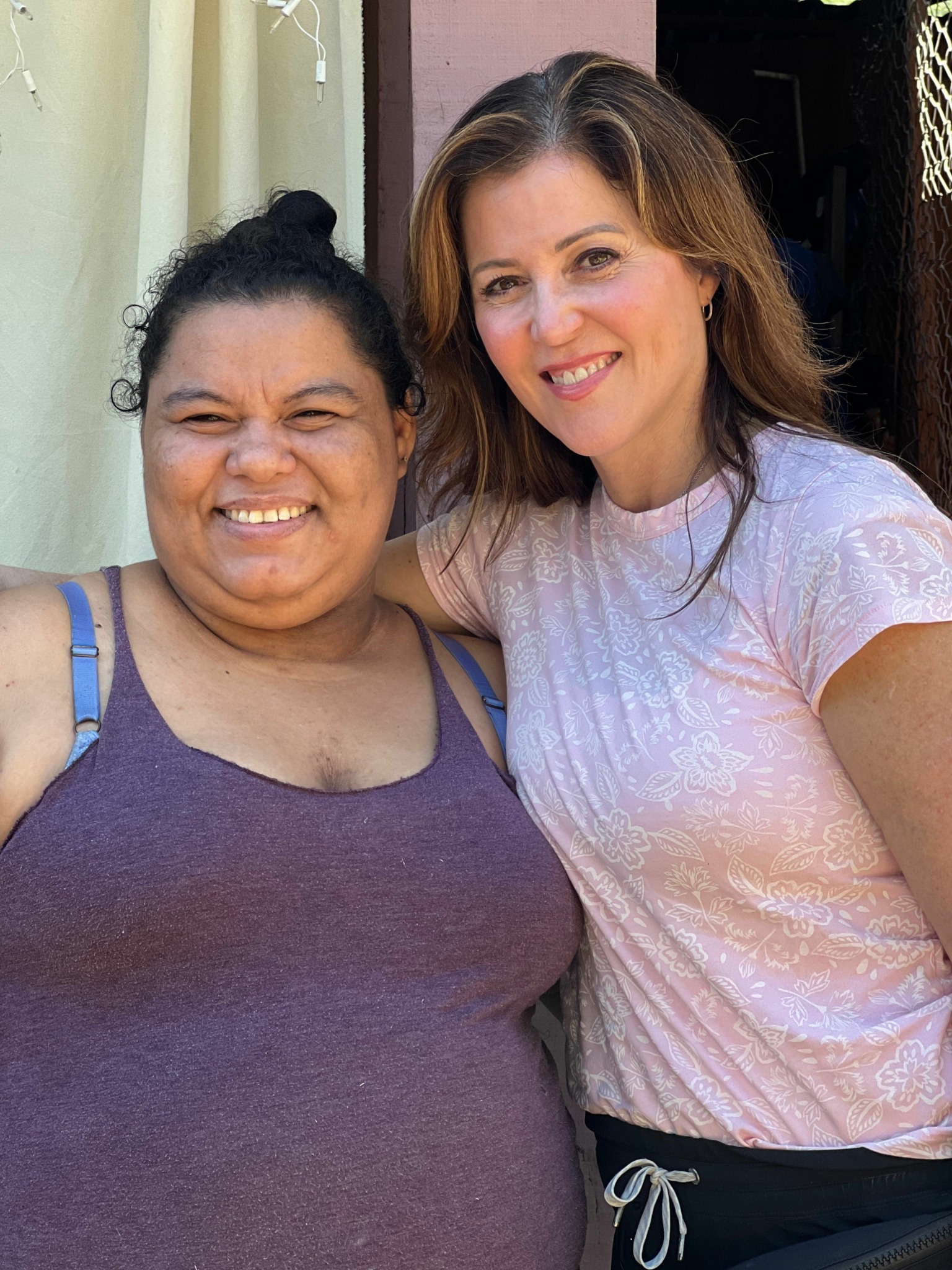
Can you share a story from your journey that illustrates your resilience?
Empowering Women in Poverty: A Journey of Financial Independence
Working with women living in poverty in a completely different country can be a challenge. When I founded One Common Thread at the end of 2019, I initially paid our Makers in cash, as none of them had bank accounts or identification cards. However, I knew our time in Honduras would be coming to an end the following summer, so I launched an initiative to help our women open their own bank accounts.
On the surface, this seems like a simple task, but in a developing country like Honduras, it was far from easy.
Before opening a bank account, our Makers needed identification cards, and that posed a significant hurdle. Ninety percent of our women had never been officially declared at birth, so they didn’t have birth certificates or IDs. This meant they would have to travel back to their birth cities—often a long journey—just to obtain a birth certificate. In most cases, they needed witnesses to confirm their birth in that city.
Once they had their birth certificates, the next step was a trip to the government offices in a larger city to stand in long lines—sometimes for days—to obtain an official identification card. Only then could they open a bank account. But there was one more challenge: the minimum deposit required to open an account.
For women living in poverty, even the small sum of $12 (about 304 Honduran Lempiras) can be a barrier, as they are often in desperate need of every penny they can get. So, we provided the necessary funds for each Maker to open an account and get their identification cards.
The impact was immediate and profound. Having an ID meant our Makers were now able to prove their existence in a formal way, a major step toward greater independence. This small but powerful change had ripple effects in their lives. Many of them gained confidence, felt empowered, and saw new opportunities open up for them.
This initiative became even more crucial when the COVID-19 pandemic hit just six months after we started One Common Thread. The pandemic led to widespread lockdowns, and we had to leave Honduras earlier than expected. But because we had already set up the infrastructure for bank transfers, our Makers were able to continue working, sewing, and receiving payments while we were in the U.S. They no longer depended on me to pay them in cash, which was a huge blessing given the circumstances.
Thanks to the foresight to help our Makers get IDs and bank accounts, they were able to continue their work and earn income, even during such uncertain times. We were unable to return to Honduras until September 2020, but by then, our Makers were already financially independent, sewing, creating, and most importantly, being paid.
Looking back, that early initiative was a miracle. It saved our foundation from collapse and gave the women of One Common Thread the tools they needed to thrive—both during the pandemic and beyond.
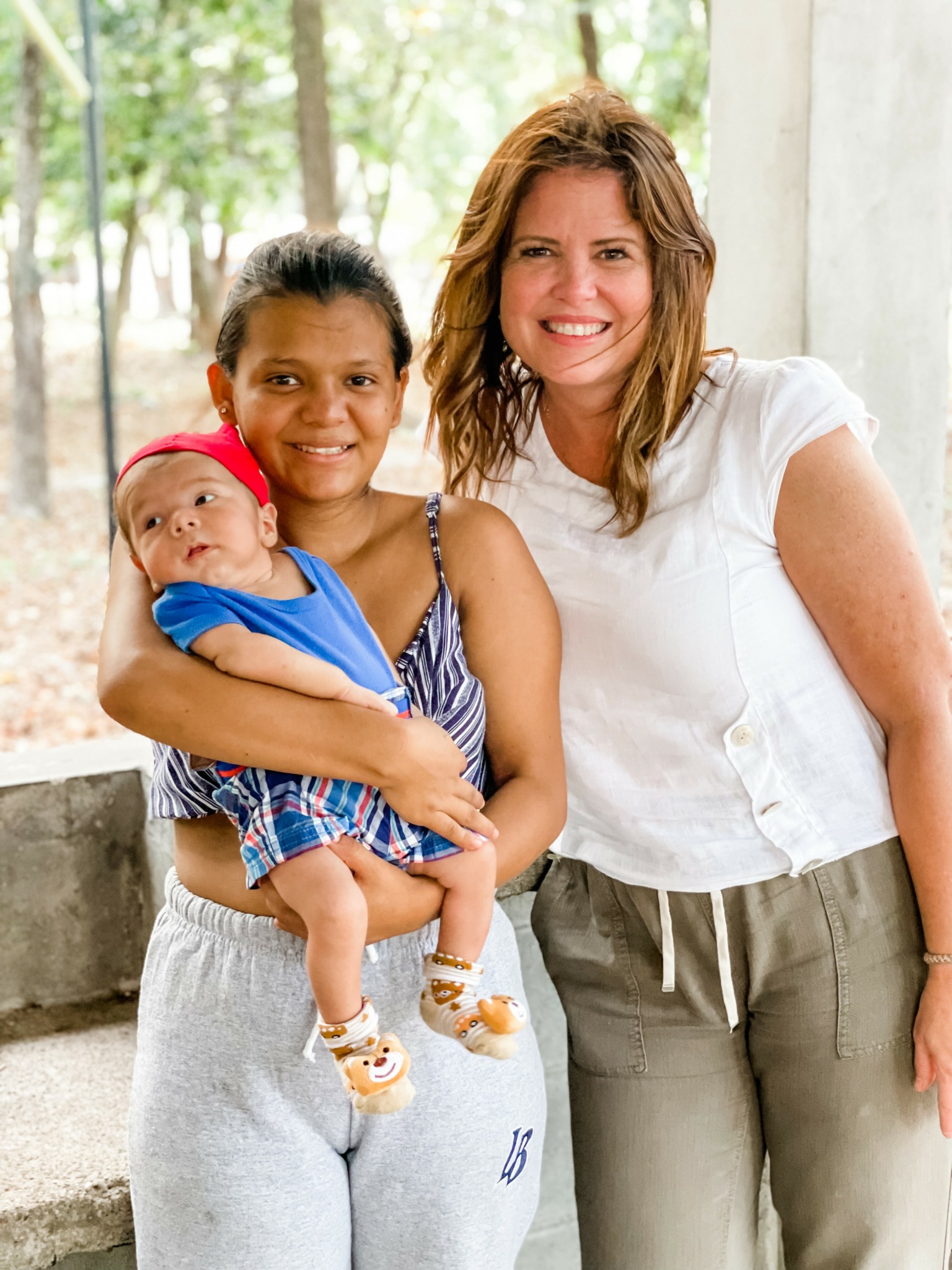
How’d you meet your business partner?
A Journey of Sisterhood and Service: Building a Non-Profit to Empower Women
Starting a non-profit with my sister has been an incredibly rewarding experience. Kym, my older sister, was the first person I called when the idea of helping women in poverty started to take root in my mind. At the time, I had enlisted the help of a 13-year-old girl named Skarleth to assist me in making a quilt for my daughter. After I paid Skarleth more than the typical wage by Honduran standards, her mother and aunts called to ask if they could also sew for me. It was then that I reached out to Kym for advice and support.
Though Kym wasn’t a quilter herself, she immediately saw the need to help these women. She encouraged me to give it a try. Kym is the one who said, “These are mothers trying to feed their families; we have to help them.” Those words resonated deeply with me. As a mother, I would do anything to help my children, and I knew that what Kym said was true.
Fast forward five years, and here we are—still going strong. We collect donated fabric, bring it down to Honduras, meet with our Makers, assess their needs, and then bring their finished quilted art pieces back to sell online. Neither Kym nor I takes a paycheck; we donate all of our time and resources to keep the foundation going.
We know this isn’t the ideal way to run a non-profit. After all, we’re just two women doing everything we can, and one of our biggest concerns is what will happen when we’re no longer able to continue. We’ve started thinking about the future and looking for ways to make the foundation more sustainable. The work we’re doing—empowering our Makers, supporting their families, and creating opportunities for change—is too important to let it fade when we can no longer carry the load.
Our Makers, their children, and the opportunity to make a difference, even in a small way, in a small country—this work is bigger than us. So, we’re still navigating how to make this foundation last and ensure that its impact will continue for years to come.
Contact Info:
- Website: https://onecommonthread.org
- Instagram: https://www.instagram.com/onecommonthreadquilts/
- Facebook: https://www.facebook.com/onecommonthreadquilts
- Youtube: https://www.youtube.com/watch?v=Gy0QYZMNns8
